DISCLOSURE: If I link to relevant products or helpful info it may be an affiliate link, meaning I may earn a small commission. As an Amazon Associate & other affiliate, I earn from qualifying purchases at no extra charge to you. The views & opinions are my own. Please see the disclaimer and privacy policy.
Last Updated on December 29, 2024
If you are taking a trip to Uganda in Africa, you might be wondering what to pack and what to wear in Uganda! We recently stayed a total of 15 days and took a 9-day safari to Uganda and have some advice for you. I am NOT a backpacker and I do not travel light, so if you want to fit it all into one suitcase, you will have to downsize after you finish reading my ultimate Packing List for Uganda!
Here are all the helpful tips for what to pack for a trip to Uganda based on our experiences.

No time to read?
Get your own printable packing list to get ready for your safari adventure!
Jump to these helpful Uganda Packing List Tips:
Need more helpful travel tips for a trip to Uganda? Check out this guide:

Are you on the list yet?
If you want to be a part of the next BUCKET LIST vacation to Uganda, send me a form!!
Step one: Packing for Uganda!
What Luggage to use on a safari in Uganda
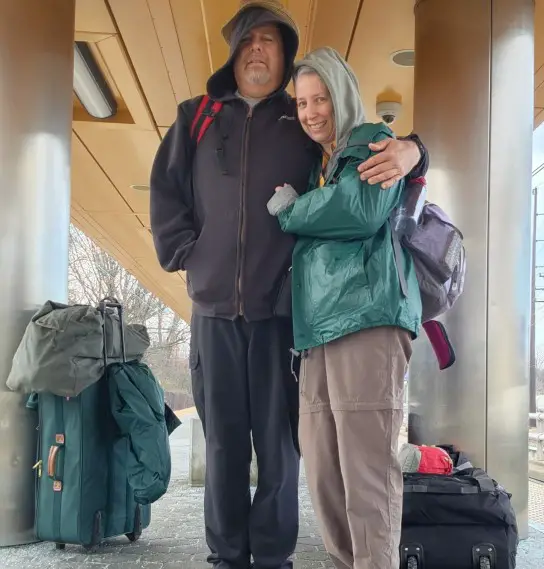
Uganda packing tips often include advice for what luggage to bring on a safari.
Soft-sided luggage is best for an Uganda safari trip. The vehicle often has limited storage in the back and it is easier to fit all the luggage in when they are soft-sided.
I took a large rolling duffle that was easy to smoosh into the back with all my clothes. I was worried that I would have trouble rolling it in places near the lodges, but all the paths were well-maintained and easily manageable. Most of the time, the porters delivered our bags to our rooms and back anyway.
More Uganda luggage tips
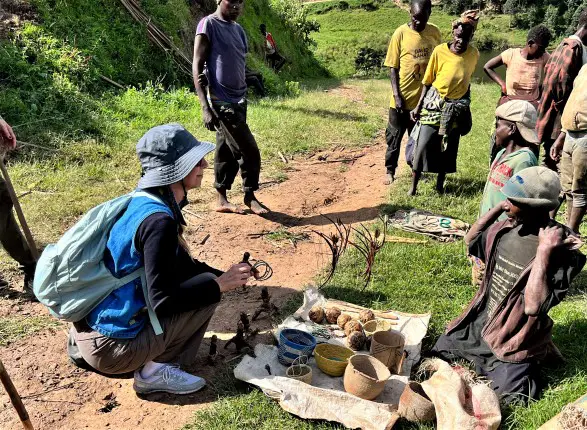
We each also packed carry-on-size backpack. I have a very old Eastsport backpack that I used for this trip. They don’t sell the exact same pack, but I found a similar one on Amazon. I thought the roller backpacks would be too and bulky. I didn’t see myself being able to put one of those heavy roller packs on, so I found something lighter.
You can use the large backpack for your day bag or bring a separate light-weight back pack or another bag for everyday use like I did. You will want to bring your day bag in the safari vehicle with you on each drive or with you on hikes. Good things to pack in your day bag are extra layers, snacks, power banks, and bug spray.
Bring Snacks on your Safari

Take some snacks. You are often in the vehicle for long journeys, so it is nice to have something to snack on while you watch the beautiful scenery go by.
Also, some days are longer than others so meals might be delayed.
If you don’t want to bring snacks with you, there is a grocery store at Victoria Mall and you can get a few items there. The mall is within walking distance of 2 Friends Hotel Entebbe. One of my tips for traveling in Uganda is to stay there for the first night or two before your safari so that you can enjoy all the fun activities in Entebbe.
Don’t drink the water in Uganda

You shouldn’t drink the water in Uganda so you will need to have a supply of drinking water. This will usually be provided by your tour guide. You will need something to carry around your water on hikes.
Uganda is trying to eliminate the waste generated from plastic water bottles. Bring a refillable water bottle. The safari vehicle has a large reservoir that you can fill up each morning when you load in and each evening when you go into your lodges. Additionally, the lodges all supply filtered drinking water in your rooms when you check-in.
Bring a carabiner to easily clip your refillable water bottle to your day bag. You will want easy-access to your drinking water on your long treks. I brought a few extra carabiners and clipped my muddy shoes to my backpack until they were cleaned.
We also took a filtered water bottle because we didn’t know that we would have an unlimited supply available to us at the lodge. We only used it once, so it probably is not necessary to bring it on a trip to Uganda.
EVEN BETTER: You can even bring a Camel-Bak to stay hydrated on longer hikes through the jungle and African safari. Camel-baks are the backpacks that you can fill with water and take sips through the straw while you are on-the-go.
No products found.
PRO TIP This might be overkill and overprotective, but I took some food-grade hydrogen peroxide to clean our water bottles. I work in a virology lab, so I usually am over-cautious!
Want your own printable packing list?
Electrical supplies for your packing list for Uganda
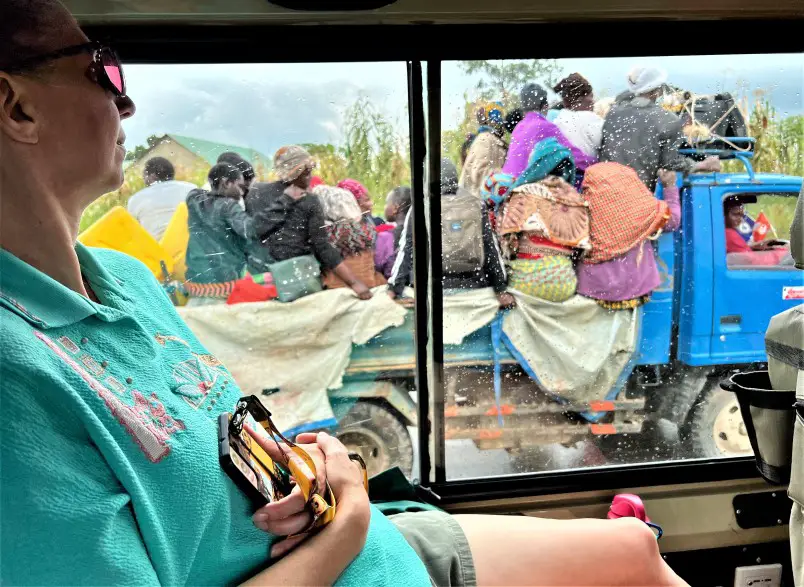
BRING A CAMERA!! Do I need to say that? We used our phones for most of the safari photos. Yes, you do get THAT close to the animals. Phones have really good cameras these days too.
Charging cords and portable charger! There is a charging port in your safari vehicle, but ours didn’t work, so be prepared. Some of the days are long so it might be good to bring an extra charging device if you tend to take a lot of pictures. You never know when you are going to need to snap a photo, so be prepared!!
On that note, make sure you have plenty of storage space on your phone or other picture-taking device! Uganda is home to one of the best places in Africa to see elephants so you will definitely be taking lots of pics of elephants as well as other wildlife!
Uganda uses UK-style electrical plugs, so bring an Electrical Adapter or two. One with multiple USB connections is ideal.
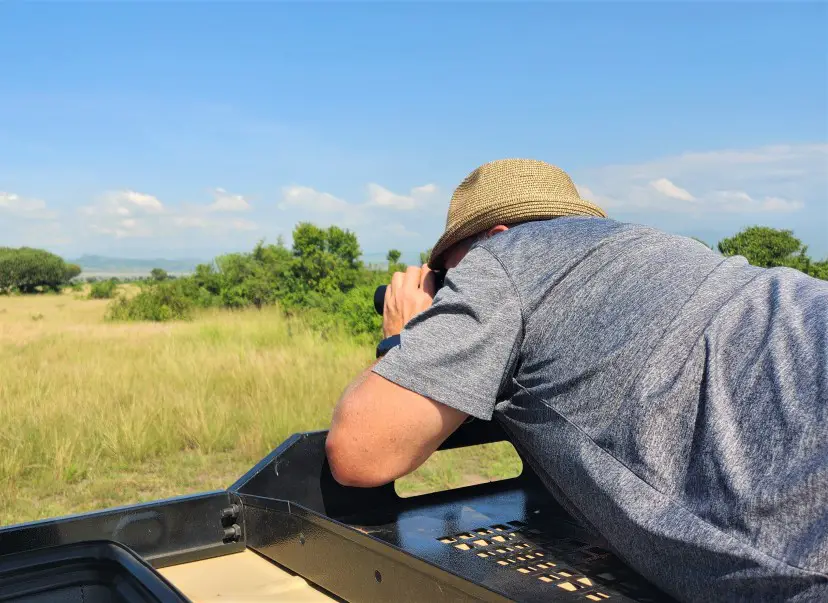
This isn’t an electrical item, but it goes hand-in-hand with seeing and photographing the African animals! It will be nice having a set of binoculars, but it won’t be absolutely necessary. Most of the animals will be close enough for you to see and photograph. Occasionally there is a herd that was far away and I used my binoculars to see them in detail. I used mine for giraffes that were in the distance and for the lions when they retreated under the bushes.
Bug Protection in Uganda
I am a fanatic about bug protection, but I am very allergic and swell a good bit, so I wanted to take every precaution that I could think of. Here are some suggestions that I used.
This is what I used:
Before we left for Africa, I used Repel Permethrin Clothing & Gear Insect Repellent, Aerosol on my button-up blouses and hiking pants with bug guard fabric spray.
No products found.
To prepare your safari clothes: You need to spray your clothes ahead of time in a well-ventilated area because they need approximately 2 hours to dry. SAFETY TIP: Wear some rubber gloves while spraying your clothes so you don’t get any on your skin –it’s nasty stuff.
When going on hikes in Uganda, I used Sawyer Products Ultra 30% DEET Insect Repellent in Lotion on my face and exposed skin when I got ready in the morning before any hike. I also used another skin spray on top of my clothes as a finishing touch before we went outside.
No products found.
I used a battery operated fan to keep mosquitos away from my face while I slept and for providing white noise. I also had a small USB fan that I used. This one is easily packable in small luggage and is more recommended than trying to use batteries.
What to pack for a GORILLA TREK in Uganda
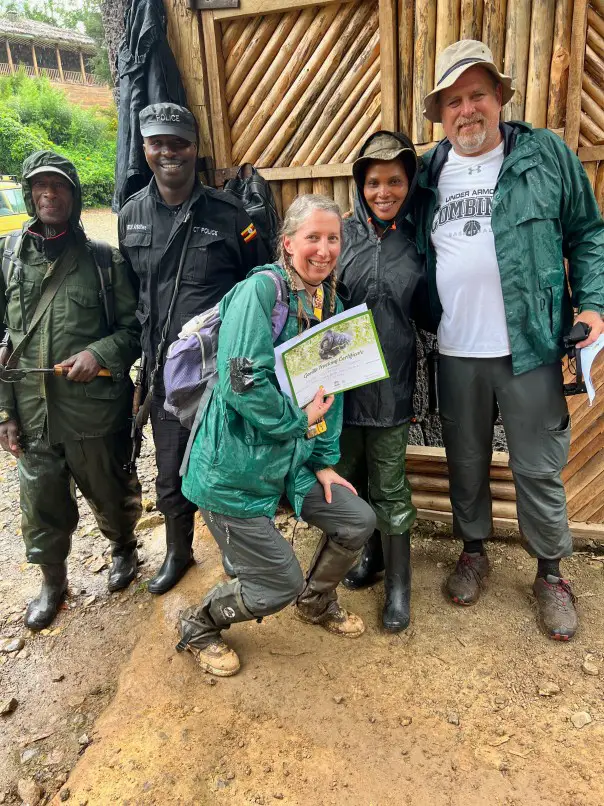
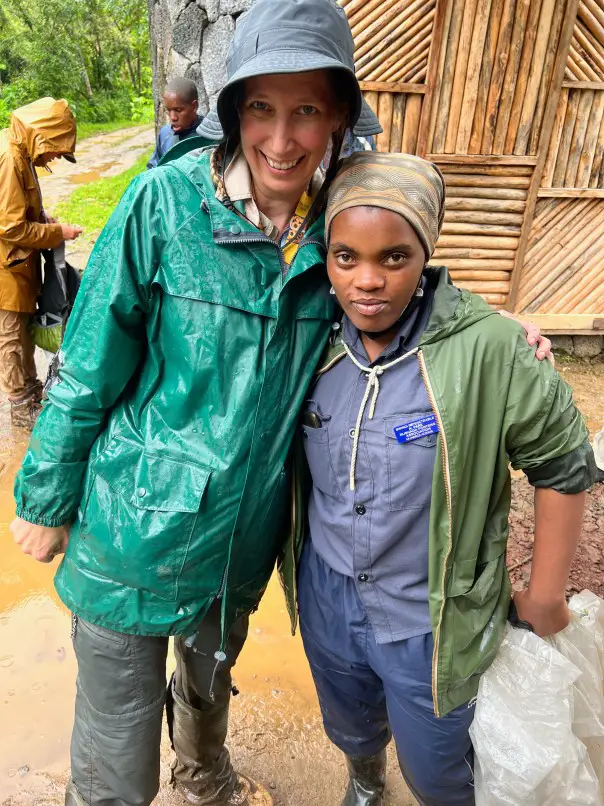
Here are some extra notes and tips for what to pack for a gorilla trek in Uganda.
Bring a lightweight raincoat
Remember it rained during our whole gorilla trek, so I have many tips for trekking in the rain!!
Make sure you have a lightweight waterproof jacket. Lightweight is key because it may be a hot day. You just want some protection so that you don’t get soaked all the way to your undergarments!
I have an old-fashioned Columbiana jacket that is long enough to come over my butt. I was able to sit down on the wet grass and watch the gorillas while the rain fell all around me.
I was considering wearing rain pants too. They would have helped keep me even drier, but I might have been too hot in them.
One of the other ladies in our tour group wore a rain poncho and stayed dry too. She packed everything in a carry-on suitcase, so if you are planning to travel light, this might be your best option!
What are Gaiters?
I borrowed a pair of gaiters from a friend and was very grateful that I had them!
Gaiters are highly recommended as protection for your ankles. They are meant to protect your shins and ankles while trekking through prickers or long grass. However, I advocate for them as water protection! They kept the water out of my hiking shoes and kept my socks dry!! They were caked in mud at the end of the trek which meant that layer of mud stayed off of my socks and shoes.
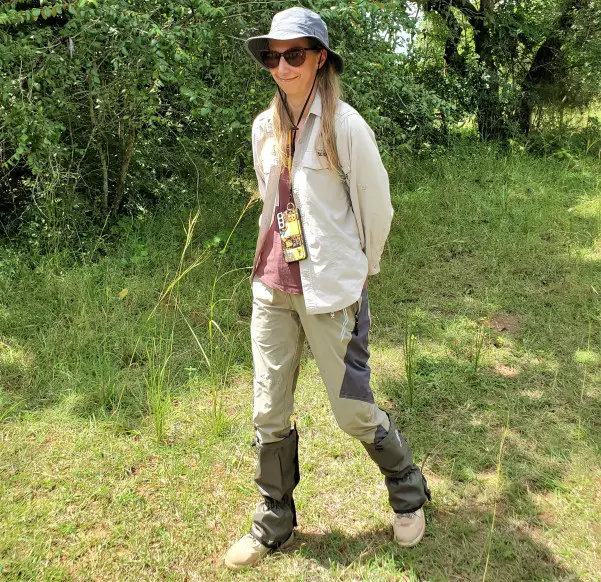
PRO TIP: If you decide NOT to get gaiters, make sure that you tuck your pants into your socks while hiking in order to prevent those nasty biting ants from crawling up your pants!
Gloves for a Gorilla Trek in Uganda
All the guides recommended wearing gloves during the trek. They suggested gardening gloves. The gloves are meant to protect you while you climb up the mountain and grab trees and bushes for support. While this would have been very helpful for me especially when we got to the dense area when I was pushing foliage away in each step and grabbing a hold of roots to pull myself along the trail, I chose not to wear them because I didn’t think I would like wearing wet gloves.
Clothing to pack for a trip to Uganda
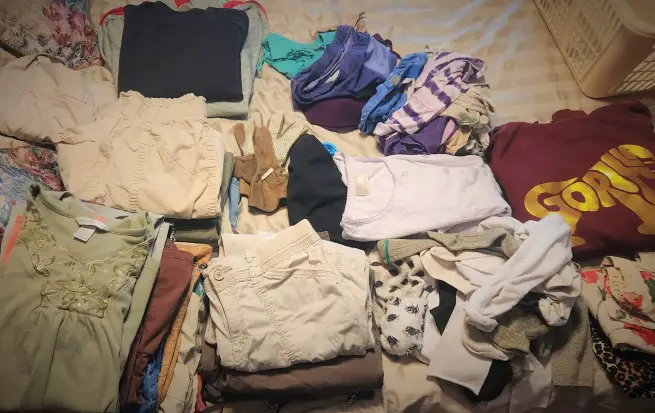
Are you wondering what to wear on your trip to Uganda? Many people suggest neutral colors on an animal safari. But really, most of the time you will be in your vehicle, so it doesn’t matter what color your CLOTHES are! There are a few times you will be out trekking through the African landscape, but the color of your clothes in Uganda is the last thing to worry about.
Always dress in layers. It is cold in the morning and HOT HOT HOT in the afternoon. Wear a light top with a long sleeve top layer that you can take off. There were a few days that we went out in the early morning, so I put an extra long-sleeve layer under my top and it kept me warm and cozy.
Wear breathable fabric. Quick-dry tops are the best so that if your top does get wet from sweat or rain, it will dry quickly.
Day trips around the city, like a Kampala city tour, are still going to be all outdoors. You will still get really hot and you will still want breathable material!
Same goes for if you are going to attempt doing your laundry. Quick dry material will be better for this! -and that brings us to the next topic.
Laundry service in Uganda
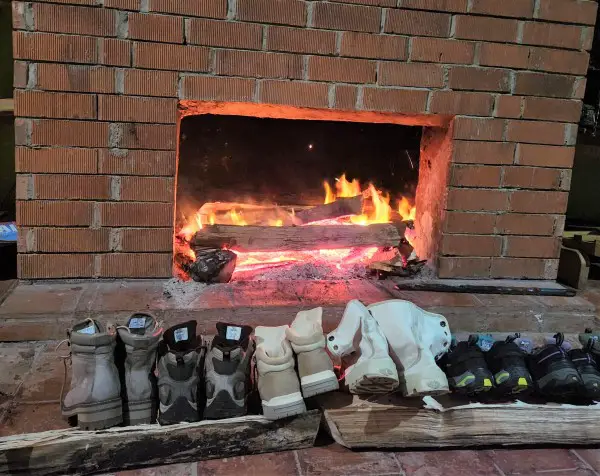
There is a laundry service at most of the Ugandan lodges, so in theory, you could get your clothes washed. However, this needs to be done when you are staying 2 nights at the same lodge. The dryer in Uganda is the sun, so if they take your laundry at the end of the day when you check in, they will wash it, but will need the following day to air dry it in the sun.
We used the laundry service once to wash my muddy hiking boots. They had to put them in front of the fireplace at night so that they would dry. I think they came out CLEANER than before I even brought them to Africa!
What clothes to pack for a safari in Uganda

Tops to wear in Uganda
I had a breathable short-sleeve shirt for each day and two long-sleeve button-up shirts that I re-wore. One of the long sleeve shirts was a Craghoppers shirt with Insect-shield in it and the other I sprayed with a bug-guard fabric spray that is supposed to last a while (even after a few washings). All shirts were neutral colors so as to not attract the bugs.
Pants to wear in Uganda
I took 2 pair of jungle pants that I also sprayed with Repel Permethrin Clothing & Gear Insect Repellent, Aerosol. One of the pair of pants had zipper pockets – I recommend lots of pockets.
PRO TIP: I did not have enough pants with me, especially when one pair got soaked and muddy during the gorilla trek. That pair was put out of commission, so then I was down to only one pair of pants. Take an extra pair of pants!
Extra clothing to take to Uganda
Mornings and evenings were sometimes cold so I had another extra layer that I put on top for warmth.
I had a jungle hat – to protect my head from the hot African sun.
I took LOTS of socks. They got sweaty and sometimes wet so I changed them often. It was really nice to be able to put on a fresh pair of socks in the middle of the day!
Footwear for a Uganda Trip
I had hiking boots for walking around the jungle and slides to wear around the lodge and to the dining hall. I still wanted to wear my socks for bug protection, so flip-flops wouldn’t have worked. One additional pair of shoes would be good for daily wear, for example, hiking sandals or tennis shoes.
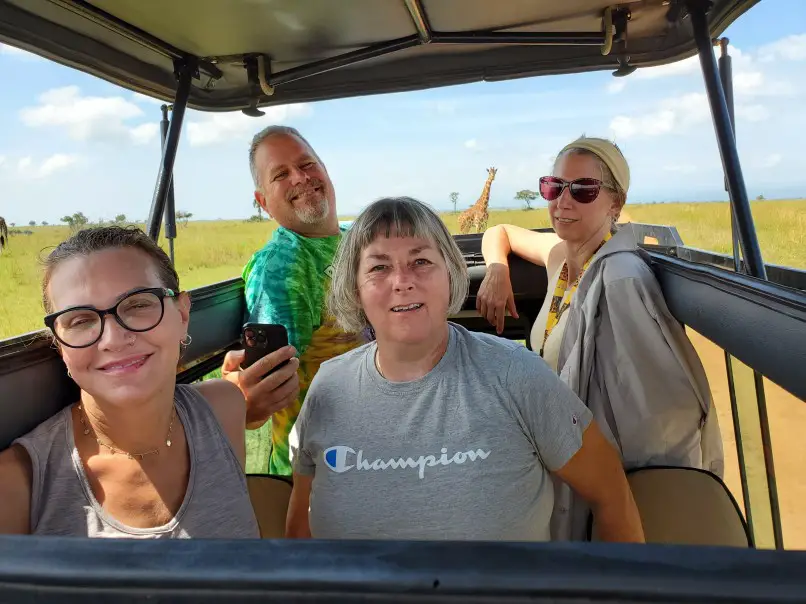
PRO TIP: You will want shoes that you can easily slip off in the vehicle. You can step on the seats to view animals out of the pop-up top, but shoes are not allowed on the seats. Shoes that come on and off easily are best to wear in the safari vehicle!!
Clothing Packing List for Uganda (see notes above for special tips):
- breathable / quick dry short-sleeve shirts (1 per day, unless you will do laundry)
- 2 button-up long sleeve blouses – sprayed with bug protection or built-in
- 2 long sleeve tops for extra layers
- 2 jungle pants – sprayed with bug protection (PRO TIP: add 1 extra pair of pants!)
- 2 – 4 pair of shorts – for all the riding around in the safari vehicle (I wore pants most of the time)
- Socks – I think I took around 10 pairs! – Take many extra pair of socks!
- 1 raincoat / poncho / waterproof jacket
- Shoes – 1 pair hiking boots, 1 pair hiking sandals / tennis shoes (for everyday walking around), 1 pair slides (to walk around the lodge with a pair of comfy, dry socks).
- Pajamas – I reserved my sleeping clothes and only wore them at night after I was cleaned up from showering. I took something with long sleeves and legs to cover my skin. The lodges have mosquito nets, but I didn’t take any chances.
- Undergarments – do I really need to remind you?!!?
Rafting the Nile River in Uganda is a completely additional packing list! If this is on your itinerary, read up for all my important tips.
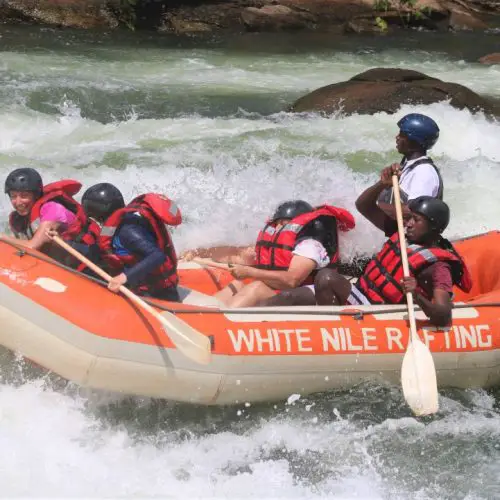
Other things to bring to Uganda
- Hand sanitizer, dry shampoo (when the shower is just a bit too cold to wash your hair), and wet wipes
- Sunscreen (we already discussed the bug spray!)
- Small bag with trial sizes of personal items
- Toilet paper or kleenex (most African potty breaks do not provide toilet paper, some are just out in the wilderness!)
Are you packed for your Uganda Trip?
There you have your ULTIMATE PACKING LIST FOR UGANDA! Did I miss anything? Let me know in the comments! Taking a trip to Uganda for an animal safari and gorilla trek is a bucket list item! Hopefully, you aren’t wondering what to take to Uganda anymore.
Don’t let packing stress you out so you can relax and enjoy this trip of a lifetime!
Like this post? Pin it for later
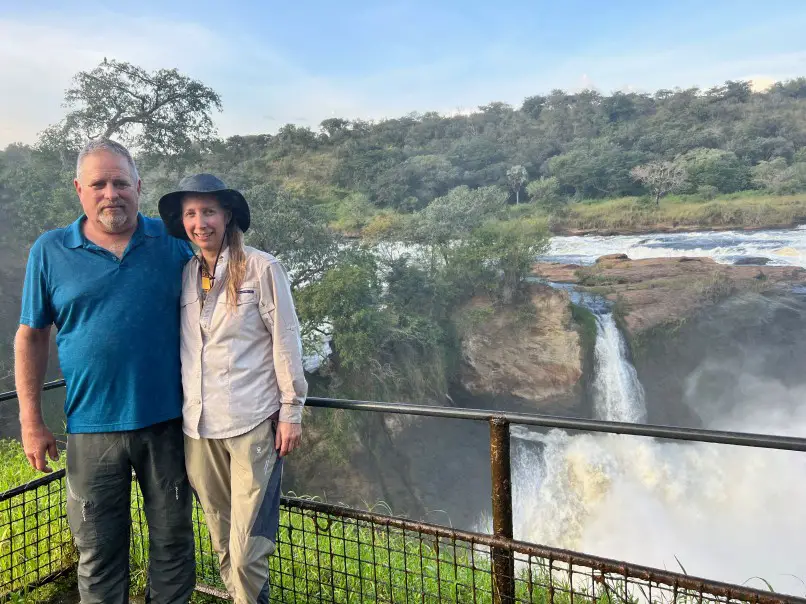

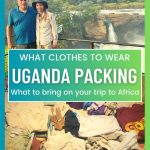
That’s a great post on what to bring when visiting Uganda. It looks like there are a lot of activities to partake in when in the country. Thanks for sharing.
Great tips for trekking and going on safari in Uganda. Your experience is a guiding source for many.
Thank you for the list. I need this for my next trip.
Thank you for the information, it was very helpful. I’m going to Uganda in a month. I do have 1 question regarding water on the gorilla trek. Would it be helpful if I brought my bladder from my Camelbak and just throw it in my daypack that I will be carrying? Since treks vary in length, I’m not sure 1 bottle of water will be enough for me. Thoughts??
Treks DO vary in length and you can have your guide request one that is to your ability. You should definitly bring enough water for your trek and hire a porter to help you carry it. They are experienced in the terrain and will be able to carry a lot more than you think! Your camelbak is a good idea. We got quite a few water breaks too!
Great tips on packing for an Uganda tour.
thanks for all the tips. One question: Did you exchange money before you got to Uganda? Or did you do it when you are there? I can’t find any place that will exchange USD to Uganda shillings. I read on a travel website that was several years ago that you can only get Uganda shillings in East Africa. Just trying to plan how much money to bring. I usually exchange $400-$500 USD and then use ATMs when I need more. But, I also read that ATMs are hard to come by and hardly anyone takes cards so cash is best but I don’t feel right carrying like $1,000 in cash with me JUST IN CASE I need it. Thoughts?
Hi Corey and thank you for your comments. ATMs are prevalent in the cities in Uganda. Our group stopped multiple times at different locations any time one of us needed more cash. No one had any difficulties with the ATM machines, so you should have no trouble going to get more cash anytime you run out and need more. Yes, you are correct there is no need for you to carry around that much cash at one time.
I didn’t change anything at the airport (which was actually a problem since I bought a SIM card there and they only accept cash). I took a walk to Victoria Mall in Entebbe on our first day and got some cash there.